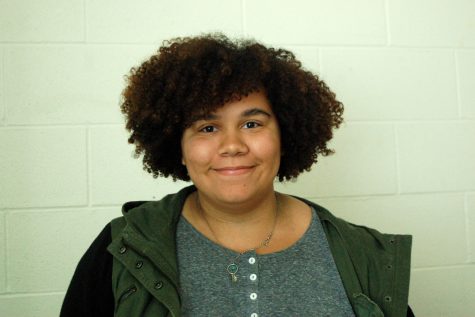The ghetto people next door
December 7, 2015
The weathered blue planks of my aunt’s apartment building jutted out at me as I ambled up the grimy steps. Thinking back to our conversation from a few months ago, I stepped over the browned blood splatter.
I could imagine her with her long brown hair pulled back in a lazy pony tail, laying on the couch in yoga pants as the signature red “Netflix” background glinted off of her pale skin. She was ranting about hearing her black, “ghetto” neighbors fighting once again.
“God, this place is so ghetto.”
Something about her sneer as she went into detail about her neighbors made me uneasy.
As far as I could see, my aunt and her neighbors led parallel lives. They were stuck in the same apartment complex in similar money situations. Her and her husband are constantly arguing. Maybe it’s because they had a baby and got married not long after high school or maybe because that’s simply the way they are. But either way, I just couldn’t figure it out.
What does ghetto even mean? What makes a person ghetto? And just what makes my aunt’s neighbors “ghetto,” but not her?
Then I realized the answer- they were black.
The definition of ghetto is a section of a city, especially a thickly populated slum area, that’s inhabited predominantly by members of an ethnic or other minority group, often as a result of social or economic restrictions or hardships.
The origin of the word is unknown, but it’s apparent that it hinted at forceful segregation. In the 16th and 17th centuries, cities in Europe began to forcibly segregate their Jewish population. Though these ghettos didn’t last, they made a reappearance under Nazi Germany. Jewish ghettos were finally abolished after the end of World War II.
The ghetto lived on, rapidly morphing into the home of the poor black community.
Blacks were segregated into racial colonies due to economic hardships, racial prejudice and cultural differences. “White flight” from inner cities after World War II also encouraged racial segregation.
But the wounds from white flight never truly healed.
In Ferguson, Missouri, the black population increased to 67.4 percent from 25.1 percent between 1990 and 2010. The white population in Ferguson dropped from 16,454 to 6,206 over the same time period.
Somewhere along the way, “ghetto” went from a noun to an adjective thrown at lower class blacks, intended to emphasize their “uncivilized” behavior.
It’s become hard for people to see past the “ghetto black American,” where the first image of a black person that comes to mind is someone talking in an ungrammatical manner, snapping their fingers and smacking their lips.
Though legal racism was abolished by the Civil Rights Act of 1964, bias and prejudice still linger. It seems that poor minorities can’t get away from the “ghetto”- they can’t flee from the physical place, nor can they escape the label.
A 2015 study conducted by the Pew Research Center found that 48 percent of whites automatically preferred whites over blacks and 35 percent favored whites moderately to strongly. 45 percent of blacks were quicker to associate positive words with blacks and negative words with whites. 28 percent showed a moderate or strong automatic preference for blacks.
Most adults subconsciously favor one race over another. This subconscious racism is seeping into our minds. I’m tired of walking through halls and hearing the few minorities we do have being “jokingly” referred to as ghetto by their classmates or even by themselves.
My dad’s side of the family is black, while my mom’s is white. The disconnect between the two is so vast, I feel like if I tried to jump from one side to the other, I’d end up on face-first on the ground.
When we’re with my dad’s family out in public, I shouldn’t have to worry about people staring at us because we don’t look the same, aren’t dressed the same, or don’t act the same. I shouldn’t have to worry about someone looking down on us with a gleam of disapproval in their eyes and the word “ghetto” on their lips.
But I do.
I’ve always heard it growled with an air of disgust and punctuated with an eye roll or a sneer. It stems from a feeling of superiority- a feeling that you’re better than the minority because of the items you possess or the way you look and behave. We’re perpetuating that disconnect between black and white adults, teens and children that will continue to last for generations.
And it hurts.
The definition of racism is changing, evolving into more than an act against a certain race. We’re starting to dig and to realize the deep-seated bias so forcefully imprinted into our minds.
“Ghetto” is a word that perpetuates these innate biases. It’s a word that shapes how we view blacks. It’s a word rooted in hate and segregation.
Sadly, it’s a word that still thrives in today’s society, constantly thrown around by blacks and whites alike to degrade poor minorities. Ridding ourselves of this subconscious discrimination is going to take a lot of awareness.
But putting “ghetto” to rest is a start.
My aunt, like most of us, has been shaped by this prejudice. She created a barrier between her and the “ghetto people next door.” But she isn’t a bad person. She’s just another American that’s fallen victim to the brainwashing of racial prejudice.
As teenagers, we have the time and the power to change it.

